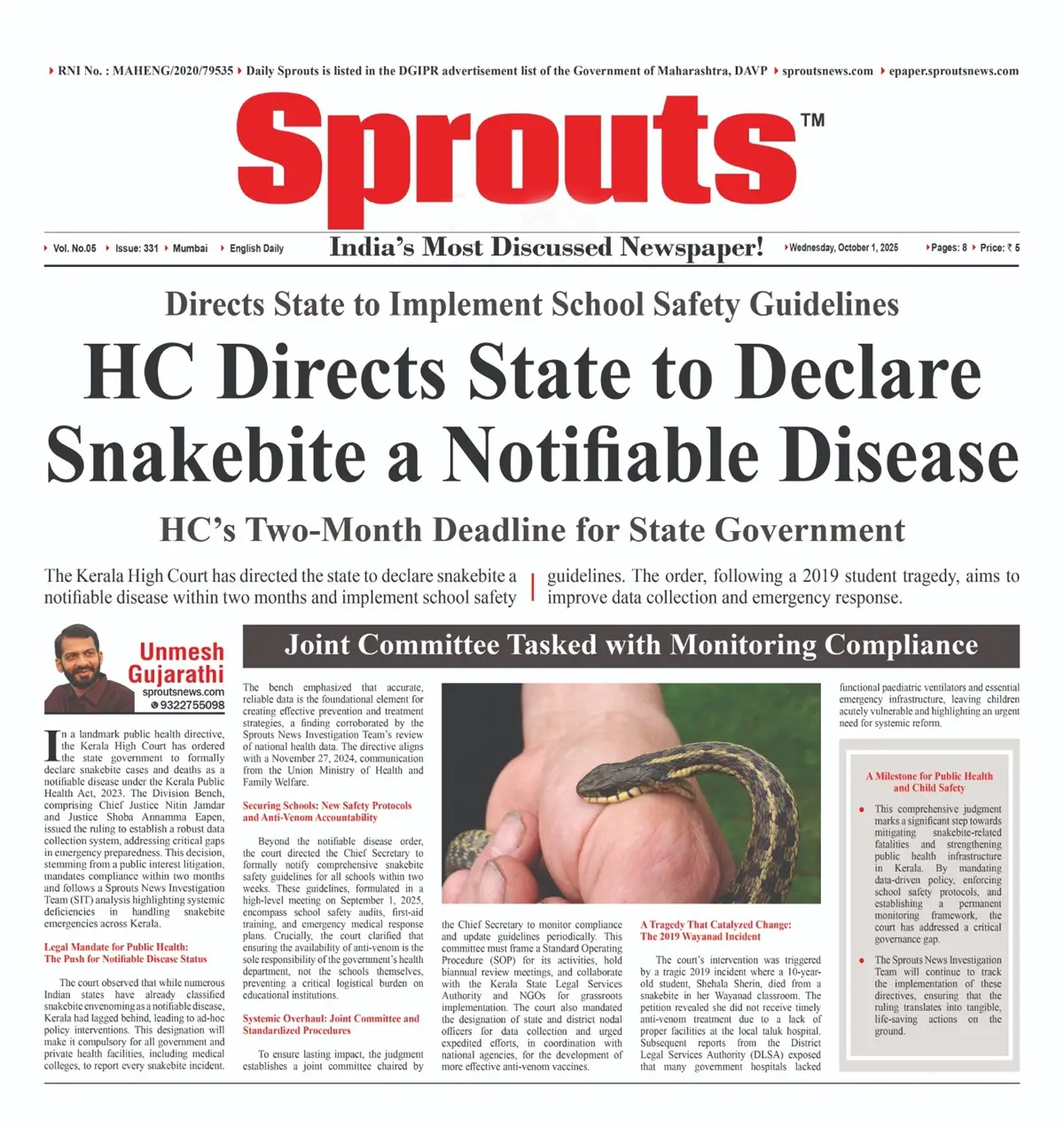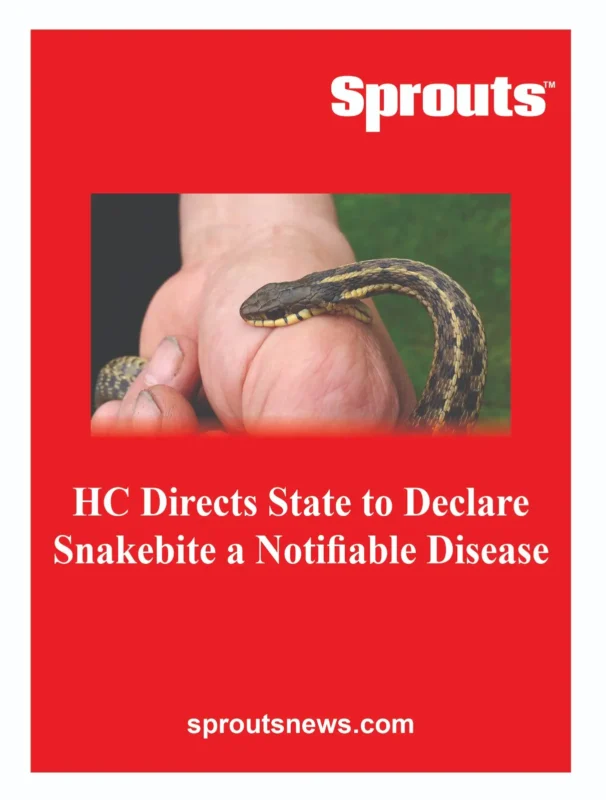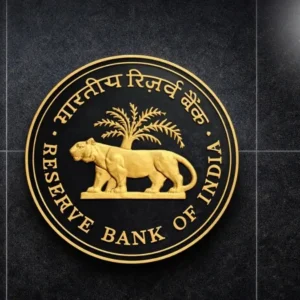Kerala High Court Directs State to Declare Snakebite a Notifiable Disease
• Directs State to Implement School Safety Guidelines
• HC’s Two-Month Deadline for State Government
• Joint Committee Tasked with Monitoring Compliance
The Kerala High Court has directed the state government to declare snakebite a notifiable disease within two months under the Kerala Public Health Act, 2023. The court also ordered strict implementation of school safety guidelines and formed a joint committee to monitor compliance. The ruling stems from a PIL filed after a 2019 student tragedy, aiming to improve data collection and emergency response across Kerala.
- Kerala High Court Directs State to Declare Snakebite a Notifiable Disease
- • Directs State to Implement School Safety Guidelines
- • HC’s Two-Month Deadline for State Government
- • Joint Committee Tasked with Monitoring Compliance
- Legal Mandate for Public Health: The Push for Notifiable Disease Status
- Securing Schools: New Safety Protocols and Anti-Venom Accountability
- Systemic Overhaul: Joint Committee and Standardized Procedures
- A Tragedy That Catalyzed Change: The 2019 Wayanad Incident
- A Milestone for Public Health and Child Safety
In a landmark public health directive, the Kerala High Court has ordered the state government to formally declare snakebite cases and deaths as a notifiable disease under the Kerala Public Health Act, 2023. The Division Bench, comprising Chief Justice Nitin Jamdar and Justice Shoba Annamma Eapen, issued the ruling to establish a robust data collection system, addressing critical gaps in emergency preparedness. This decision, stemming from a public interest litigation, mandates compliance within two months and follows a Sprouts News Investigation Team (SIT) analysis highlighting systemic deficiencies in handling snakebite emergencies across Kerala.
Click Here To Download the News Attachment
Legal Mandate for Public Health: The Push for Notifiable Disease Status
The court observed that while numerous Indian states have already classified snakebite envenoming as a notifiable disease, Kerala had lagged behind, leading to ad-hoc policy interventions. This designation will make it compulsory for all government and private health facilities, including medical colleges, to report every snakebite incident. The bench emphasized that accurate, reliable data is the foundational element for creating effective prevention and treatment strategies, a finding corroborated by the Sprouts News Investigation Team’s review of national health data. The directive aligns with a November 27, 2024, communication from the Union Ministry of Health and Family Welfare.
Securing Schools: New Safety Protocols and Anti-Venom Accountability
Beyond the notifiable disease order, the court directed the Chief Secretary to formally notify comprehensive snakebite safety guidelines for all schools within two weeks. These guidelines, formulated in a high-level meeting on September 1, 2025, encompass school safety audits, first-aid training, and emergency medical response plans. Crucially, the court clarified that ensuring the availability of anti-venom is the sole responsibility of the government’s health department, not the schools themselves, preventing a critical logistical burden on educational institutions.
Also Read: SEBI Slaps ₹5 Lakh Fine on Narendra Ramshankar Dubey for Market Manipulation.
Systemic Overhaul: Joint Committee and Standardized Procedures
To ensure lasting impact, the judgment establishes a joint committee chaired by the Chief Secretary to monitor compliance and update guidelines periodically. This committee must frame a Standard Operating Procedure (SOP) for its activities, hold biannual review meetings, and collaborate with the Kerala State Legal Services Authority and NGOs for grassroots implementation. The court also mandated the designation of state and district nodal officers for data collection and urged expedited efforts, in coordination with national agencies, for the development of more effective anti-venom vaccines.
View the court order copy- Click here
A Tragedy That Catalyzed Change: The 2019 Wayanad Incident
The court’s intervention was triggered by a tragic 2019 incident where a 10-year-old student, Shehala Sherin, died from a snakebite in her Wayanad classroom. The petition revealed she did not receive timely anti-venom treatment due to a lack of proper facilities at the local taluk hospital. Subsequent reports from the District Legal Services Authority (DLSA) exposed that many government hospitals lacked functional paediatric ventilators and essential emergency infrastructure, leaving children acutely vulnerable and highlighting an urgent need for systemic reform.
A Milestone for Public Health and Child Safety
This comprehensive judgment marks a significant step towards mitigating snakebite-related fatalities and strengthening public health infrastructure in Kerala. By mandating data-driven policy, enforcing school safety protocols, and establishing a permanent monitoring framework, the court has addressed a critical governance gap. The Sprouts News Investigation Team will continue to track the implementation of these directives, ensuring that the ruling translates into tangible, life-saving actions on the ground.


















